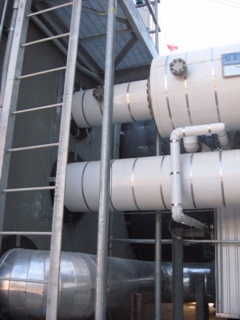The industrial insulation industry has seen many innovations in the last decade that provide specifying engineers new options for insulating high-temperature piping and equipment. Such products can present unique advantages and offer superior solutions for certain, specialty applications.
For example, IIG recently introduced InsulThin™ HT. This hydrophobic, microporous silica blanket is being added to specifications where a pipe’s proximity to its surroundings limits the insulation thickness potential or where installer workspace is confined. The addition of InsulThin HT coincides with IIG’s mission to be the solutions provider for all of your high-temperature insulation needs. Our goal is to recommend the best product for the application rather than a one-product-fits-all solution.
IIG’s unique ability to offer multiple solutions for your application is what sets us apart from other manufacturers. The leading and preferred product in our line of traditional insulation solutions is Thermo-12® Gold calcium silicate. When your application requires the following specifications, then Thermo-12 Gold calcium silicate could be the solution for your application.
Corrosion Inhibition – Corrosion Under Insulation (CUI) is the leading cause of pipe and equipment failure. Contributing factors include exposure to precipitation with harmful chlorides, poor maintenance, installation error, thermal expansion, mechanical abuse (foot traffic), and cycling of systems. While some of these risks can be avoided or minimized, potential for CUI formation always exists.
The best way to combat this issue is with the XOX Corrosion Inhibitors that are integral components in IIG’s Thermo-12 Gold calcium silicate formulation. Once water penetrates the vapor barrier, it reacts with the XOX to form a silicate layer on the surface of the pipe. This layer impedes the galvanic reaction process that causes CUI. For more information on CUI refer to our Technical Bulletin 012.

High Compressive Strength Resulting in Reliable Thermal Performance – Fibrous insulation materials such as fiberglass and mineral wool rely on organic binding agents to give them structure and sustain insulating value, and the hydrophobicity of silica aerogel has a similar benefit. But as temperatures rise, the hydrophobicity of silica aerogel is reduced and the binders of the fibrous materials begin to burn out of the insulation, eventually becoming non-existent at temperatures above 600°F. The performance of these types of insulations is thus reduced over time. What’s more, insulated systems are subject to constant vibration of equipment, thermal expansion and mechanical abuse that could have a dramatic effect on the thickness of the material once structure, rigidity and compressive strength are compromised.
Thermo-12 Gold Calcium Silicate is a granular insulation. Its raw components are molded into a cementitious form that lack any organic binding agents that would affect its compressive strength or thermal performance, making it a resilient choice for applications up to 1200°F. For more information on compressive strength refer to our Technical Bulletin 011.
Low Surface Temperature – A common misconception for specifiers is that two different types of insulation with thicknesses calculated to yield equivalent heat loss will share the same surface temperatures. A thin, blanket-style insulation such as InsulThin HT requires significantly less thickness to accomplish a given level of heat loss compared to Thermo-12 Gold calcium silicate. However, reducing insulation thickness also sacrifices the surface area where the heat can escape. When the same amount of heat is escaping from a reduced surface area, the heat is more concentrated. Therefore, by selecting a thicker insulation material such as calcium silicate, it will lower the surface temperature because the equivalent heat loss is spread over a larger surface.
To learn more about the reliability and value that IIG’s Thermo-12 Gold calcium silicate brings to your high-temperature insulation system, contact IIG.
